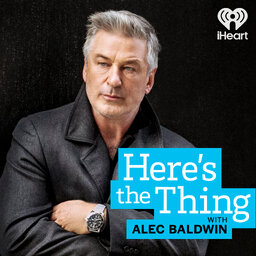Andrea Crosta: Defender of Wildlife
With as many as a million plant and animal species expected to vanish by 2050, the time is now to intervene and reverse the tide…before it is too late. Andrea Crosta is the founder of the non-profit Earth League International, an “Intelligence agency for Earth,” which protects wildlife, oceans, and forests through intelligence-gathering, research and investigative operations. ELI collaborates with governmental agencies and helps bring down illegal wildlife traffickers, their networks, and those engaged in the “criminal exploitation of nature.” Their work has resulted in the arrest of a jaguar-fang ring in Bolivia and helping the Mexican government pursue the “Cartel of the Sea,” which trafficks sea cucumbers and totoaba. Alec Baldwin speaks with Andrea Crosta about the experiences that led him to this work, what it’s like meeting wildlife traffickers face to face, and why we are in a “now or never” moment for our ecosystem.
In 1 playlist(s)
Here's The Thing with Alec Baldwin
Award-winning actor Alec Baldwin takes listeners into the lives of artists, policy makers and perfor…Social links
Follow podcast
Recent clips

Here's The Thing: Trailer
01:41

E Jean Carroll on Writing and Resilience
35:20

Kat Owens Raises Environmental Awareness Through Art
40:08
 Here's The Thing with Alec Baldwin
Here's The Thing with Alec Baldwin